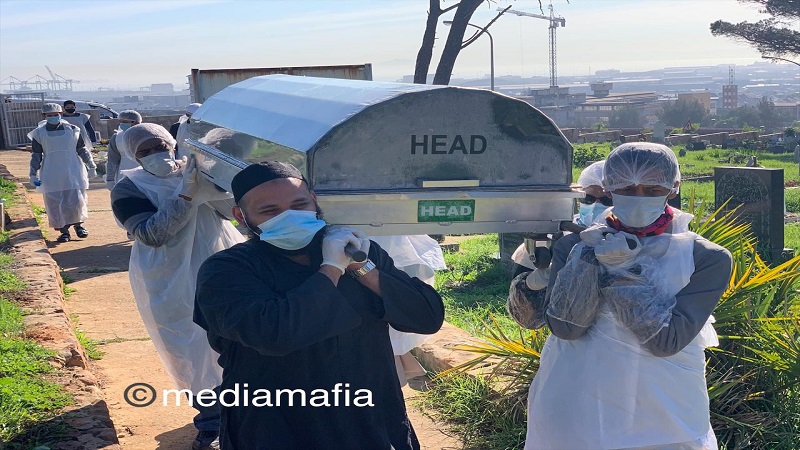As the number of COVID-19 fatalities in South Africa continues to rise, so does the despair of not being able to hold traditional burials . The Muslim community is no exception, with the virus claiming at least 59 lives in the Western Cape alone, with 95 deaths nationally. The increased price of the funeral services has also raised some eyebrows.
Speaking to VOC on Tuesday, independent undertaker Yaghyah Canfield explained that the price difference could be attributed to the requirements of handling a virus-laden body. While an average janaza can set a family back up to R5000, there have been COVID-19 burials that reportedly cost R9000.
Usually, Canfield assists poorer families and provides his service for free. But he has been forced to charge people at least R2000. Between himself and his partner, he stated that they use a total of four suits with an average cost of R250 each. Each needs to be completely disposed of once they have been used. This amounts to around R1000. There is also a specific type of body bag that needs to be used, which “is only available in Johannesburg and costs another R1000”.
“We hope that what we have done so far for the community, that it’s the best we could have done it. We have to show people the dignity they deserve,” he said.
“The service that I render is to keep the cost as minimal as possible. What I need is only to recover the losses of the suits and the body bags. So far, for all the cases I’ve been doing so far, my prices have gone up to R2000. It is a bit sad but it’s what we need to do,” he added.
He explained that Personal Protective Equipment (PPE) gear is crucial and that bodies are wrapped in specific plastic. According to the Western cape Undertakers Forum chairperson, Ebrahim Solomans, however, the PPE was essential even before CoVID-19 came along.
Canfield said that there is no external funding that goes toward undertakers and that the average burial service pays out about R1800, while the family pays the remainder.
Conventionally, bodies are cleaned by “Ghasiels/Ghasielahs” who are trained and aware of the various regulations involved in burial. Pieces of clean cloth are used to wash the body with soap and water, dried, openings such as mouth, nose and ears closed and then the body shrouded.
But, given the ongoing pandemic, scholars had to come to a different arrangement, which includes wrapping the body in plastic to avoid contamination of the soil that the mayyit is buried in.
Canfield explained that deceased Muslim Covid-19 bodies are taken to the nearest masajid that has ghusl facilities available and tayammum is performed. This process replaces water with clean sand and is usually used if there is an absence of water or – as in this case – the deceased had an infectious disease.
The body is then shrouded, placed in a plastic bag and taken directly to the Makbara where only immediate family is allowed to attend and Salah-tul Janaza performed alongside the kabr (grave). Canfield added that the family is still responsible for the booking of the hole. He said that those with commodities, including the elderly, are being advised not to clean bodies.
Read more about the burial process here.
VOC






 WhatsApp us
WhatsApp us 

